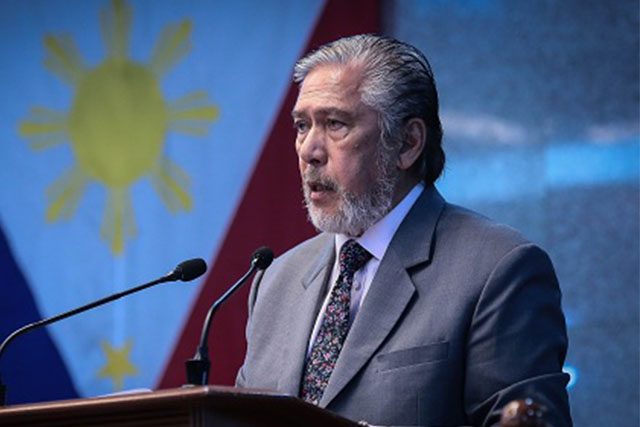
Senate President Vicente “Tito” Sotto III on Wednesday tweeted a warning to the critics of the proposed anti-terror bill after it was passed to Malacañang on Monday despite his previous assurance that it wouldn’t target dissenters and protesters.
The Duterte administration ally in a series of tweets hit critics who have been asking the chief executive to veto the highly controversial measure seen to potentially stifle dissent and curtail constitutionally-protected civil liberties.
“Ganun ganun na lang kung murahin nila si PRRD, ngayon nananawagan sila sa kanya?” Sotto wrote on Wednesday morning.
Academic institutions, various groups, activists and vocal critics of President Rodrigo Duterte have been urging him to veto the Anti-Terrorist Act of 2020 following its transmittal to his office.
Sotto also shared a quote on his Twitter account and added a remark. The quote reads:
“Respect is an important element of personality. Whatever you give to others will return to you, with profit.”
Sotto added: “Ganun din sa disrespect! Watch out!”
His remarks were not well-received by Filipinos who pointed out that “respect is earned, not demanded.”
“This is why we fight. Giving people like this more power in legislation is terrorism. Kitang-kita na he has the capacity and audacity to say ‘babalikan namin kayo’ with complete disregard of the Constitution and the fact that they’re (servicing) people first,” a Twitter user responded.
“You did not get elected to be kings. You got elected to serve!! As such, the people who put you in power have the right to criticize your every move and question your intentions. The Filipino people PAY YOU after all,” wrote another online user.
Others claimed that the lawmaker’s words could be perceived as a form of threat, which in itself could be penalized under the proposed anti-terror bill.
“This is a threat. Sounds like a terrorist to me,” an online user said in response to a social media card quoting Sotto’s tweets.
“That’s a clear threat. That Anti-Terrorism Bill is for all critics,” wrote another Filipino.
Under the measure, a terrorist can be someone who “engages in acts intended to cause death or serious bodily injury to any person, or endangers a person’s life.”
Even an individual who merely threatens to commit such acts would be imprisoned for 12 years.
There were others, meanwhile, who reminded Sotto of his remarks last week where he said that critics of the government would not be classified as terrorists under the bill.
“Is this the same man who said we are free to criticize the government?” a Twitter user said.
Another Twitter user included a screengrab that featured the lawmaker’s exact words before.
ha? hatdog https://t.co/bS80fHKtXZ pic.twitter.com/a7nJVhveLa
— mickhell | #OUSTDUTERTE (@vmickhell) June 10, 2020
“Akala nila ‘pag kontra sa gobyerno pwede nang i-classify na terrorist, hindi. Gusto mo murahin mo ang gobyerno, morning, noon and night, hindi ka pwede pa rin, you do not fall under the category definition,” Sotto told the reporters last week.
“Kunyare rally, protesta, may nagbato ng molotov, terrorist ba ‘yun? Hindi. Ano ikakaso sa kaniya? Eh di arson or any crime in the Revised Penal Code,” he added.
The anti-terror bill includes a provision that “advocacy, protest, dissent, stoppage of work, industrial or mass action and other similar exercises of civil and political rights” shall not be considered as “terrorism.”
However, the same section says that it only applies if those activities “are not intended to cause death or serious physical harm to a person, to endanger a person’s life, or to create a serious risk to public safety.”
Critics raised concerns that the provision could be prone to abuse as existing laws had people arrested for merely posting threats on social media about supposedly having the president killed.
Such instances had not quelled fears on how the government might implement the proposed measure once it becomes a law.
Presidential spokesperson Harry Roque on Wednesday morning said that the chief executive will “review the provisions of the bill even more closer” due to public interest.









